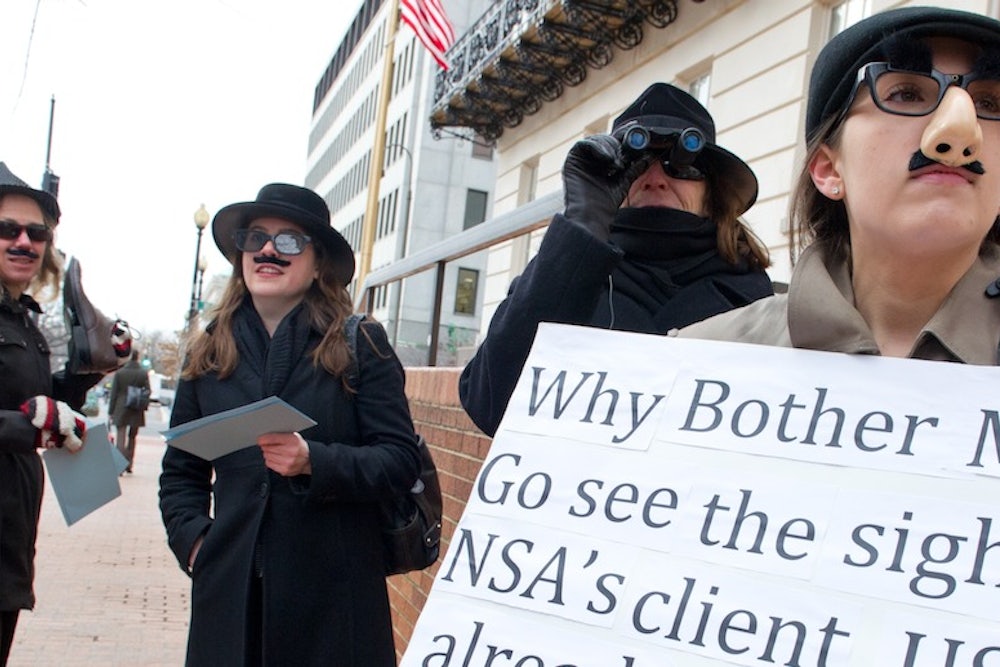Yesterday, in a path-breaking victory for the Fourth Amendment, Judge Richard Leon held that the National Security Agency’s collection and storage of metadata from all American phone calls probably violates the Constitution. There are many persuasive aspects of this remarkable opinion, but the most important is Leon's evisceration of the relevance of a 1979 case, Smith v. Maryland, that the Obama administration and the Foreign Intelligence Surveillance Court have repeatedly used to justify the warrantless surveillance program in the first place.
Smith held that the police could use a “pen register” to collect the phone numbers dialed by someone who had called a robbery victim and threateningly claimed to be the robber. The Court held that Smith had no legitimate expectation of privacy in his dialed phone numbers because he turned them over to the phone company knowing that the phone company might collect them. There is an obvious difference, of course, between recording a few dialed numbers of one person suspected of a crime and recording all dialed numbers of everyone suspected of no crime. But the FISA court dismissed the distinction in these words: “When one individual does not have a Fourth Amendment interest, grouping together a large number of similarly situated individuals cannot result in a Fourth Amendment interest springing into existence ex nihilo.”
Judge Leon meticulously resurrects the distinction, and shows on several levels why Smith is an unconvincing justification for mass surveillance today—and why the Obama administration, had it read Smith closely, should have known better.
First, Leon cites U.S. v. Jones, the GPS tracking case, for the proposition that “short-range, short-term tracking” is constitutionally different than “constant month-long surveillance.” The pen register in Smith operated for a few days, while the government today is collecting and maintaining a database containing “five years worth of data” and, as Leon put it, “there is the very real prospect that the program will go on for as long as America is combatting terrorism, which realistically could be forever!”
Second, Leon argues, it’s one thing to say that people expect phone companies to occasionally provide information to law enforcement” and “quite another to suggest that our citizens expect all phone companies to operate what is effectively a joint intelligence gathering operation with the Government.“ (On this point, Leon cites polls suggesting that “some 56 percent [of the public] oppose the NSA’s collection of telephone records for future investigations even though they do not involve actual conversations.”)
Third, the “almost Orwellian technology” that allows the government to store and analyze the phone calls of millions of citizens was “the stuff of science fiction” in 1979 but is all too real today, allowing data mining far into the future. Finally, Leon points out that the “nature and quantity” of the information revealed by phone data is far greater than it was more than three decades ago: The number of mobile subscribers today is more than 3,000 times greater than the more than 91,000 telephone subscribers in 1984, he notes, and cell phones have become multipurpose recording devices whose metadata can reveal far more about people’s intimate lives than simply the phone numbers they dial.
For all these reasons, Leon concludes, people do have an expectation of privacy in the archives of their cell phone metadata over five years that they lack in their dialed telephone numbers over brief periods of time. But then, in a crucial footnote, Leon goes on to confront the circularity of the “expectation of privacy” test itself. Now that citizens know that local police companies are requesting “massive cell phone ‘tower dumps,’ each of which can capture data associated with thousands of innocent Americans’ phones,’ Leon notes, you might say that our subjective expectations of privacy have diminished because the government is training us to expect that our privacy will be invaded. But Leon resists this circular argument. “The point, however, is that the experiences of many Americans—especially those who have grown up in a post-Smith, post-cell phone, post-PATRIOT Act age—might well be compared to those people who the Court in Smith compared to the 'refugee from a totalitarian country, unaware of this Nation’s traditions, [who] erroneously assume [] that the police were continuously monitoring' telephony data.” What the Smith Court called an erroneous assumption in 1979 has now become a nightmarish reality. But Leon notes a crucial disclaimer in the Smith opinion that the Obama administration had ignored. "In such circumstances,” the Smith Court stressed, “where an individual's subjective expectations had been 'conditioned' by influences alien to well-recognized Fourth Amendment freedoms,” subjective expectations of privacy “obviously could play no meaningful role in ascertaining what the scope of Fourth Amendment protection was.” Instead, “a normative inquiry would be proper.”
So there, buried in the Smith opinion itself, you see why the Obama administration was wrong to rely so heavily on it from the beginning. Even Smith said that, in face of ubiquitous surveillance, judges should make a “normative inquiry”—asking, in other words, how much privacy citizens in a free society are entitled to demand, not how much diminished privacy they subjectively expect. Despite this crucial disclaimer, the Obama administration and the FISA Court continued to invoke the Smith case as the creaky buttress for warrantless surveillance. Judge Leon's inspiring decision has exposed the failure of that analogy, and showed why the NSA's metadata collection threatens Fourth Amendment values at their core.
Jeffrey Rosen is the legal affairs editor of The New Republic.
